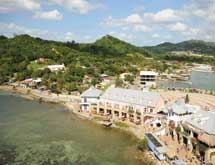 Located off the northern coast of Honduras, the island of Roatan has become a popular vacation spot in recent years. Two cruise ship terminals have been built on the island within the last five years, thanks to the island’s proximity to popular scuba diving spots like the Mesoamerican Barrier Reef. The island’s growing tourism industry – its most important industry – has increased the demand for utilities, and the task of fulfilling its need for electrical power belongs to the Roatan Electric Co. (RECO).
Located off the northern coast of Honduras, the island of Roatan has become a popular vacation spot in recent years. Two cruise ship terminals have been built on the island within the last five years, thanks to the island’s proximity to popular scuba diving spots like the Mesoamerican Barrier Reef. The island’s growing tourism industry – its most important industry – has increased the demand for utilities, and the task of fulfilling its need for electrical power belongs to the Roatan Electric Co. (RECO).
RECO began in 1993, when it was founded as a co-op to take over the island’s power grid from the state. In 2008, RECO was purchased by investor Kelcy Warren and became a private company. Director of Operations Matthew Harper says RECO was granted a franchise by the Honduran National Electric Co. to be the only provider on the island to encourage investment in the island’s power infrastructure. “The only competition per se are independent generators – there are a couple of hotels that generate their own power,” Harper says.
Serving approximately 12,000 customers, RECO has grown by nearly 13 percent over the last three years and there is potential for more. However, red tape is preventing RECO from accomplishing some goals. Harper says that with greater cooperation between RECO and Honduras’ National Energy Commission, the company can continue to implement forward-thinking projects such as the wind farm project that is nearing completion.
The need to add more generating capacity and take advantage of the island’s renewable resources was the driving force behind RECO’s wind farm project, according to Harper. The $5 million project will add about 3 megawatts of capacity to the island’s power grid. Located close to the island’s airport and just 5 kilometers from RECO’s existing power plant, the wind farm makes full use of the island’s location.
The use of wind power will be a boon to the island’s residents, he adds, because it would help shield them from the fluctuations in the price of diesel fuel, which is the primary source of electrical energy on the island at the moment. “What the wind would afford us is that we’d avoid the cost of generation, so there wouldn’t be any fuel adjustments,” Harper says, adding that residents could see reductions in their energy costs by 40 percent once the wind farm project is completed.
RECO also is increasing its capacity by installing two new diesel generator units that can each match the island’s base-level demand of 5 megawatts. Those will feed two substations on either end of the island, creating a looping feed that will allow power to be rerouted in the event of an outage. With the grid’s current radial feed layout, Harper explains, an outage at any point on the line means outages for everyone beyond that point.
Political Issues
Standing in the way of significant developments for RECO is its rocky relationship with the National Energy Commission. “We presented a tariff package for proposal three years ago when we took over, and we’ve yet to receive a resolution,” Harper says. “That is not giving our investor the security to want to move on.”
“This is a difficult government to deal with, and the regulator’s only part of that,” says Richard Warren, owner and vice president. “We have issues that we have to work through with them because they get pressure from the political side to get the cost of electricity down as low as they can at a time when prices are higher than ever.”
Ironing out the politics of the situation will be the key to development in the future, Warren says. As long as investors feel secure enough to make contributions, RECO will continue to improve the standard of living for the residents of Roatan for years to come. “We need to install additional diesel generation and we need to finish this wind farm, and we simply have to get through this political firestorm we’re going through,” Warren says.

